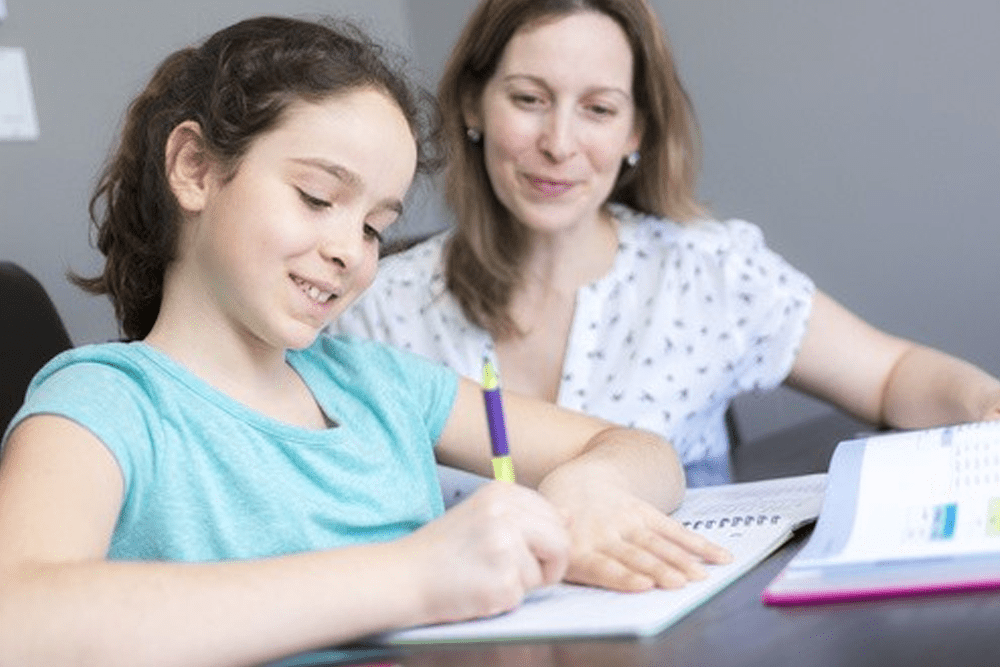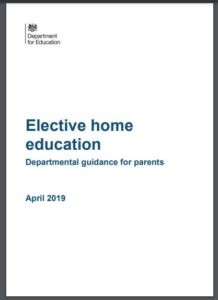The word elective means it’s something that you’ve chosen to do.
Elective home education is different to home tuition that might be given by a local authority, or education provided by a local authority somewhere other than a school.
This page helps parents of children with SEND explore the decision to home educate, including the possible pros and cons. There is information about how to go about educating your child at home and what you need to do. If your child has an EHC plan, or if you’re thinking about stopping home education, there is some specific advice about this too.

In law , parents have the right to be able to educate their child at home. That includes children with special educational needs. The law also says that it’s parents who must make sure that, if their child is of compulsory school age, they get an appropriate full-time education.
, parents have the right to be able to educate their child at home. That includes children with special educational needs. The law also says that it’s parents who must make sure that, if their child is of compulsory school age, they get an appropriate full-time education.
Compulsory school age is when your child’s education starts and finishes. In the UK it’s from the start of the school term following your child’s fifth birthday, until the last Friday in June in the school year when they reach 16. If your child’s 16th birthday is in July or August, compulsory school ends on the June date before their birthday.
There’s nothing in law to say what a ‘full-time’ education is. A child in school should get between 21 and 25 hours of education a week, depending on how old they are. But home education is very different to school, and there are no rules that say a child should get a certain number of hours of education each week.
Young people between 16 and 18 can be educated at home so that they can take part in further education or training. But there are no specific rules about what education should be provided if a child is over 16.
So, in short, if you’re educating your child at home, you’re responsible for
There are no specific legal requirements about the content of home education. That means that education at home doesn’t need to include any particular subjects or follow the National Curriculum. You also don’t need to enter your child for any exams.
Important to know
![]() If you decide to teach your child at home, you’re responsible for their education. That includes any extra special educational needs support. The local authority may check that what you’re teaching is suitable and good enough. If they think it isn’t, they can give you a school attendance order.
If you decide to teach your child at home, you’re responsible for their education. That includes any extra special educational needs support. The local authority may check that what you’re teaching is suitable and good enough. If they think it isn’t, they can give you a school attendance order.
This means you won’t be able to home educate, but instead you will have to register your child at a school the local authority names. If you don’t, you can be taken to court.
As a parent, there are lots of reasons why you might choose home education, such as your religious or cultural beliefs or if your child is being bullied.
If your child has special educational needs, then you might make the decision to home educate
Recently, there has been a big increase in the number of children being home educated.
 Some of these are where parents and children have made a conscious choice to educate at home, particularly during and after the Covid pandemic. Other parents have turned to home education because although they would like their child to be in school, they can’t find a school to fit their needs. Many of these are families with a child with special educational needs or disability (SEND) who find the school environment extremely challenging or who aren’t getting support that works.
Some of these are where parents and children have made a conscious choice to educate at home, particularly during and after the Covid pandemic. Other parents have turned to home education because although they would like their child to be in school, they can’t find a school to fit their needs. Many of these are families with a child with special educational needs or disability (SEND) who find the school environment extremely challenging or who aren’t getting support that works.
For this group of parents, educating their children at home is less likely to be an active choice, but more likely to be a response to difficulties being at school. Feeling like there is no choice but to educate your child at home puts many families under pressure and in a difficult position.
Sometimes school staff also put pressure on parents to remove a child who doesn’t ‘fit in’. This is called off-rolling and can amount to the same as informal, illegal exclusion.
If your child is finding school very difficult and they’re not managing, or if you think they might be permanently excluded, you shouldn’t feel pressured into ‘choosing’ home education. There are other options. If you want to find out more about these or discuss your situation, contact us.
Moving to home education is usually a big decision for any parent or family, and it can affect lots of areas of family life. So, it’s important to think it through carefully. If you have a child with SEND, the decision can be more complicated. You will have to make sure they get the SEN support they need too. If their needs are complex or severe, that can be challenging.
Think about how long you want to home educate for. You may think your child would benefit from a few months or a year of home education, but then they would want to go back to school. Or you might decide you want to keep your child out of school completely.
Being clear about your long-term goals will help you plan what you’re going to do at home and how you’re going to do it. So, for example if your child is 14 and wants to eventually go to university what you’ll be doing will be very different from if your child is six and you’re focusing on play-based activities.
Take as much time as you can to think carefully about the main issues, including the possible pros and cons. It’s vital for you to talk to your child about what being at home and away from school might mean for them. Homeschooling affects you and your wider family too, so it’s a good idea to get the views of everyone that will be affected. Some people also find it helpful to talk to other parents with a child with SEND who are already home educating.
We talked to parents who home educate a child or children with SEND and asked them what some of the main pros and cons are. This is what they said.
Teaching your child at home gives you lots of flexibility and control over what they learn
 You don’t need to follow a fixed timetable, give formal lessons, stick to school hours or holidays or have any set curriculum. That means you can learn in many different ways, and go out and about and visit places when it’s quiet. You can do the learning when your child is at their best and most able to focus and concentrate – whether that’s 7am or 7pm. You can choose a broader learning experience for your child, including life and social skills, mixing with a wide range of people and age groups and doing less ‘desk based’ learning.
You don’t need to follow a fixed timetable, give formal lessons, stick to school hours or holidays or have any set curriculum. That means you can learn in many different ways, and go out and about and visit places when it’s quiet. You can do the learning when your child is at their best and most able to focus and concentrate – whether that’s 7am or 7pm. You can choose a broader learning experience for your child, including life and social skills, mixing with a wide range of people and age groups and doing less ‘desk based’ learning.
You will need to make sure your child is getting a broad and balanced education though. That means you’ll need to teach them a range of different things. You’ll need to plan what to teach them, check how well they’re learning and monitor their progress. You’ll also have to find resources and do your own research.
Home education can be child-led
Home education is individual tailored learning. You can focus on your child’s strengths and interests and work at their level. That usually means they will be more engaged, and learning will be more enjoyable. For many children this helps them build confidence and self-esteem across all areas of their lives.
Some parents start from a topic of interest and work outwards from there. For example, if your child is interested in all things Japanese, you could learn some of the language, explore the history and culture, learn to make the food and watch some baseball (popular in Japan apparently).
Reduced stress for your child and for you
Parents tell us that home education sometimes isn’t easy, but that it’s often a lot less stressful for their child than being in school. Many parents home educate because their child struggles so much in school and, for whatever reason, school-based education doesn’t work for them. When that stress is removed it can have a big effect on a child but also on the whole family. Many parents say their child is happier and makes more progress at home.
Consistency
In school, if a child misses something or doesn’t finish a piece of work, there often isn’t the opportunity to go back and finish it. At home, whenever you stop a piece of learning, you can just start again from where you left off. That can give your child a more complete and consistent education.
Positive impact on your relationship
Parents who home educate get to know their child or children very well and spend lots of time with them. You’re the expert on your child, so you should be able to meet their needs well and you can give lots of support and attention. That can bring you closer together.
The costs
 The cost of home education can be a lot – financially and in other ways. Most families who home educate don’t get any help with the financial costs of teaching at home. That means you’ll probably be paying for resources, equipment, books, trips and exams. If you decide to use tutors or other educational suppliers or providers, you’ll need to pay for those too.
The cost of home education can be a lot – financially and in other ways. Most families who home educate don’t get any help with the financial costs of teaching at home. That means you’ll probably be paying for resources, equipment, books, trips and exams. If you decide to use tutors or other educational suppliers or providers, you’ll need to pay for those too.
Giving your child the SEN support they need can add an extra level of cost too. For example, you may need to pay for special software and a tablet or computer, work books made of coloured paper and overlays or sensory equipment. If your child is likely to do exams, then the exams themselves, plus any SEN support they need to sit an exam can also be costly.
Home education takes a lot of time and energy and that will probably affect your work life – in fact, you may not be able to work at all. That can affect your income, but it can also affect your view of yourself and who you are. For many people their work life is an important part of a balanced life and losing that can be hard.
It can be isolating
Not every family finds this, but for some parents and children, home education can be lonely. School life for a child is about more than education. Sometimes children can end up feeling lonely and depressed when they’re not at school. They may miss their friends and it’s easy for them to become isolated.
If you’re a single parent or you haven’t got a good support network, you might find it hard too. Many families use local home-schooling clubs and events to help children socialise and make friends. There are lots of online home education groups and networks too, though they don’t suit everyone. Find what works for you.
Not having the right expertise and knowledge
Some people seem to be natural learners, but not everyone is. If you’re not confident about your own skills and understanding, you may find home education hard. Most parents aren’t qualified teachers or teaching assistants, so you’ll be learning new skills. You’ll need a good level of knowledge yourself, or be able to develop one, especially as your child gets older when they may be learning at a higher level.
If your child has complicated or specific learning difficulties, you might need specialist support to help them learn. Getting advice and help from specialists can be hard when your child isn’t in school and you’re out of ‘the school system’. If you’re on a budget, paying for private advice may not be an option for this kind of support.
Negative impact on your relationship
 Home education can be intense, when you’re together every day for much of the time. If your child has challenging behaviour, complex needs or difficulty with focus and concentration that can be very hard for both of you. You can also end up being everything to your child – teacher, parent, entertainer, therapist and more. That’s a lot of pressure for both of you and that can affect your relationship.
Home education can be intense, when you’re together every day for much of the time. If your child has challenging behaviour, complex needs or difficulty with focus and concentration that can be very hard for both of you. You can also end up being everything to your child – teacher, parent, entertainer, therapist and more. That’s a lot of pressure for both of you and that can affect your relationship.
Being educated at home can be a big step for everyone, not least for your child. It’s really important for you to find out how your child feels about it. Find out whether they have any worries and if they do, what you can do to ease these. Keep talking about how things are going. Ask how your child is feeling about being at home instead of at school. If you’re not sure your child feels able to tell you, ask a friend or someone else who supports your child to talk to them.
Legally, at the moment you don’t need to register or get the local authority to agree if you want to teach your child at home. The only exception is if your child is currently on roll at a special school. You can find out more about this below. There are plans for a compulsory register of children who are home educated to be developed in the future.
If your child isn’t in school, the local authority might ask how you’re educating them. So, you might find it helpful to tell the local authority home education service that you’re educating your child at home.
 Some parents choose to home educate when their child is young, so they may never be in the school system. But if your child is on roll (registered) at a school and you decide to take them out to home educate, then you should tell the head teacher in writing. This will help to prevent any mix-ups about why your child isn’t at school and issues about their attendance.
Some parents choose to home educate when their child is young, so they may never be in the school system. But if your child is on roll (registered) at a school and you decide to take them out to home educate, then you should tell the head teacher in writing. This will help to prevent any mix-ups about why your child isn’t at school and issues about their attendance.
Only one parent needs to give their go ahead for their child to be taken off a school’s roll. This is the parent that a child lives with. If you and your child’s other parent can’t agree about whether they should be taken off a school roll, the family court will make a legal decision about it.
The head teacher will tell the Elective Home Education (EHE) service what you’ve decided. Schools also have a legal responsibility to protect children from harm (safeguard) and they will pass on any concerns they have about a child being at home for their education
If you’re taking your child out of school completely, the head teacher must accept your decision. But if you decide you want to send your child to school some of the time and home educate for the rest, they can refuse. This is called flexi-schooling (find out more about this below).
What happens then?
Once the EHE service knows you are home educating your child, they will send you information and an adviser may offer to come and visit you and your child at home. You don’t have to have a home visit – you could meet somewhere else or give examples of what you’re doing with your child some other way.
At a home visit, the EHE adviser will talk to you about the education you’re giving your child. You can show them examples of work, resources, timetables and anything else you think will show what you’re doing. It’s helpful to keep a record of the work you’ve done, the visits you go on and the progress your child is making. The aim of the visit is to give you support, especially around your child’s special educational needs. Staff from the EHE team can offer ideas, suggest strategies and make recommendations.
After the visit, you’ll be sent a home visit report. This will have information in it about what you discussed, plus any plans for the future or recommendations. If your child has an EHC plan, or is being assessed for one, the report is also added to the EHC hub. This means other professionals and the SEN 0-25 teams can see it too.
The EHE service in Devon has a SEND Education Adviser whose role it is to support families who are home educating a child with special educational needs.
Flexi-schooling is when you and your child’s school share their education – your child goes to school for part of the week and is home educated for part of the week. It’s arranged formally between a school and parents and can be a long or short-term arrangement. It’s usual to have a written agreement that’s signed by you, the headteacher and your child, if it’s appropriate.
A few schools in Devon are offering this and it can work well to support some children and young people with SEND. As a parent you have a right to ask for the school to consider a flexi-schooling arrangement and they must consider it properly. But flexi-schooling isn’t a right. The headteacher is the one who makes these decisions. To make it work, you, your child, the headteacher, class teachers and SENCo will all need to work together.
It’s different for every family. Overall, most families who home educate a child with SEND find it a positive experience. But there are challenges, so if you find you’re struggling, get help and support. You can contact Devon’s Elective Home Education Team, other home educators and the team at DiAS.
Research shows that most families go through a similar experience once their child starts being educated at home.
 The first two or three weeks is a rest and recovery period. School is often stressful for children and parents and this time is about lowering stress levels and connecting with each other. Lots of parents spend time doing nice things with their children. This gives time for children to accept the change and parents to think about the next step and beginning learning.
The first two or three weeks is a rest and recovery period. School is often stressful for children and parents and this time is about lowering stress levels and connecting with each other. Lots of parents spend time doing nice things with their children. This gives time for children to accept the change and parents to think about the next step and beginning learning.![]() There is information for parents on the Devon EHE website and that’s a good place to start. It has information about:
There is information for parents on the Devon EHE website and that’s a good place to start. It has information about:
There’s generally no general financial help towards resources, tutors, support and activities. If your child is age 14-16 and having elective home education, there are a few colleges that offer places part time. If they do this, the college can get some funding for them directly from the Education Funding Agency. Go to the EHE service website for more information.
There are lots of organisations, websites and groups that can give you support and advice. Some are Devon based and can help you meet up with other home education families and families who have children with SEND. Others are national and offer information and advice. They can be helpful for sharing ideas and resources and for some of the social life that your child could be missing if they’re not in school.
When your child is in school, the special educational needs coordinator (SENCO) is the SEN expert. They have a good understanding of what kind of support can best help a child and can put that in place. They also work with other professionals who can give more specific advice and strategies. When you’re home educating, you’re likely to have to do those things yourself.
 If your child has been in school, a good place to start would be their school plan. Every child with SEND should have a written school plan of some kind, which sets out their needs and the support they should get. If you haven’t got a copy, ask the school to give you one before your child leaves.
If your child has been in school, a good place to start would be their school plan. Every child with SEND should have a written school plan of some kind, which sets out their needs and the support they should get. If you haven’t got a copy, ask the school to give you one before your child leaves.
Look through the plan and see what support you’ll need to give for your child’s special educational needs. Some of the support they’ve had at school can be transferred easily to you at home. That includes things like one-to-one support from a teaching assistant, breaking information down into small chunks and taking regular movement breaks. Some SEND support may be to do with managing the school environment itself. By educating at home, you’re unlikely to need to do that same support there.
What’s left after that should give you a good idea about what you may need to do at home.
There are lots of charities and organisations that support families of children with SEND. Many of them can help with learning ideas that fit your child’s specific needs, such as handwriting practice, support for dyslexia and visual cue timetables and actions. During the Covid pandemic lots of organisations also created lists of good resources to help in different curriculum areas.
If your child has never been to school, or there isn’t a school plan, you may not have this kind of information or knowledge. You may need to have your child assessed to find out what specific needs they have, and what kind of support would best help them. As your child grows and develops further you may also need to have their needs assessed. You can find out more about how to do that in the section below.
Educational psychology assessment
An Educational Psychologist (EP) is a specially trained psychologist. They are an expert in child development and education. They use their expertise to help children and young people with difficulties around:
If your child had SEN support in school, and isn’t being assessed for an EHC plan, you will have to arrange for this kind of assessment and advice yourself. You will also need to pay to have it done.
If your child is having an EHC needs assessment, the SEN 0-25 team may arrange for them to have an educational psychology assessment as part of it.
Health assessments
 Parents and carers can ask for a referral to any service that’s provided through Children and Family Health Devon.
Parents and carers can ask for a referral to any service that’s provided through Children and Family Health Devon.
There is a self-referral guide for each service on their website, or you can call them and ask for information and advice. Details are at the end of this guide.
Some of the services you can access include:
Your GP is often a good place to ask for help for your child. If they can’t directly refer you, they may know where you can get help or how to access it. If you’re worried about your child, or their behaviour, and think they might need to be assessed, talk to your GP first. They can make a referral if needed.
You can find out more about getting further specialist help and assessment on our website.
It’s up to you what you teach your child, and you don’t have to follow a set curriculum. In fact, many parents don’t, and instead are totally led by their child’s interests and skills. Whatever your child is learning should be suitable for their age and needs.
You can also mix academic type ‘lessons’ with child-led learning, where your child can explore their own interests. You can go out and visit leisure centres, take part in classes, go on trips to museums, gardens and zoos and use your local community.
If your child is likely to go back into school at some time, or take exams such as GCSEs, you can help them be well prepared. You should know the curriculum and course content and your young person’s learning should be guided by that.
Because you don’t need to follow the hours of the usual school day, you can be flexible and plan learning around your child. So, you could arrange the more difficult learning for the times when they’re likely to be most focused, or work around hospital or therapy appointments.
You can support and teach your child and you can use private tutors or others to help you. Some parents use distance learning courses if their young person is studying for GCSEs or A levels. There are other ways of teaching too, such as parent support groups which offer tuition, and companies which give part-time tuition.
As a parent, you take on the responsibility for making sure that anyone involved in your child’s education is safe to work with children. That includes anyone that teaches them at home or anywhere other than a state-funded school. You should make sure that they have been checked by the Disclosure and Barring Service (DBS).
Exams: Important to know
![]() Your young person can take exams such as GCSEs and A Levels. You’ll have to pay the exam fees and contact exam boards and nearby exam centres. You may also need to pay for extra exam support, for example if your child needs someone to write or read for them during the exam. This can sometimes be difficult to arrange and costs quite a lot, so many families spread exams out over a few years. Make sure you know well in advance how this will work and plan.
Your young person can take exams such as GCSEs and A Levels. You’ll have to pay the exam fees and contact exam boards and nearby exam centres. You may also need to pay for extra exam support, for example if your child needs someone to write or read for them during the exam. This can sometimes be difficult to arrange and costs quite a lot, so many families spread exams out over a few years. Make sure you know well in advance how this will work and plan.
It’s worth remembering that there are different paths your young person can take to reach their end goal. Colleges and universities are being encouraged to accept other forms of evidence of a student’s skills and knowledge, apart from formal qualifications. This could include things such as a portfolio of work.
A group of parents who home educate have developed a resource for other parents around exams and qualifications.
 We asked parents who are home educating children with SEND for their top tips. These are some of the main ones.
We asked parents who are home educating children with SEND for their top tips. These are some of the main ones.
If your child already has an EHC plan
If your child has an EHC plan, you can home educate them. By choosing to do that, the legal responsibility to make sure your child gets the educational support that’s set out in their plan will become yours. So, once you home educate, the local authority no longer has a legal duty to provide any of the special educational support that’s in your child’s EHC plan.
If there is social care and health support included in the EHC plan, these should continue to be given and funded, providing they’re still appropriate. That includes any personal budget for these areas.
If your child has an EHC plan and the support they’re getting at school isn’t working, before you decide to home educate, talk to the school and the SEND Statutory team. Those children who have an EHC plan are those who need more complex and specialised support, and that may be hard for you to provide at home. Talk to the SEND Statutory team about whether the plan needs to change – to set out different support or to change the place where your child goes to school.
If your child has an EHC plan which names a school, and you now want to home educate
If you want to apply for an EHC needs assessment
If you’re home educating your child and you think they might need more support, or you think that their needs aren’t clear, you can ask the local authority for an EHC needs assessment. You can do that by filling out an online form through Devon’s EHC Hub or by writing to the SEND Statutory team at Devon County Council and asking for one.
When you ask for an assessment, you’ll need to show clearly why you think your child needs one. So, you’ll need good evidence that they may have unmet, or unclear, special educational needs.
EHC plan reviews: Important to know
![]() If you home educate, the local authority must still look at and review your child’s EHC plan every year. They should check to make sure that you’re giving the right support and your child’s needs are being met.
If you home educate, the local authority must still look at and review your child’s EHC plan every year. They should check to make sure that you’re giving the right support and your child’s needs are being met.
If you aren’t contacted by the SEND Statutory team around 8 weeks before the EHC plan is due to be reviewed, get in touch with your caseworker there. You can find their contact email in the left-hand column of your child’s EHC Hub pages. Your child’s needs will change over time, so it’s important to review their EHC plan every year.
Need to know more?
Home education, EHC plans and needs assessments, personal budgets and other types of education and support can be complex to understand and find your way around. We’ve given you the basic information here, but if you need to know more, or talk about your particular situation, contact us.
 Whatever the circumstances, at some point you may want your child to start or go back to school, or they might decide that’s what they want.
Whatever the circumstances, at some point you may want your child to start or go back to school, or they might decide that’s what they want.
Some parents find that after a while, educating their child at home takes its toll on everyone. Some parents find it a ‘full on’ or intense experience, especially if their child has challenging behaviour. Home educating can affect relationships too if a parent and child don’t get a break from each other.
For other parents it’s the time it takes up or the costs of home education that become too much. Family circumstances may change and make it difficult to keep going, or sometimes a child’s needs change as they get older too. What worked well when they were six may not be working so well when they are 10 or 12.
Once your child is being home educated, it can be difficult to get back into a school environment. If your plan is for them to return to school or go to a new school, it can take time for plans to be made and the right school place to be found. During this time, the difficulties that may have led to your decision to home educate, such as anxiety or school avoidance, can become much worse. That can make it less likely that school will be a success when they eventually go back.
First, talk to your child or young person and find out what they think and feel about going back to school. Some children can find it hard to re-adjust. If your child has never been to school, it could be a challenging and stressful experience.
If they have worries about starting school or going back, you and the school are going to need to know what these are and tackle them. Bear in mind that what they think they need may be different from what you think. You can find out more about how to get your child or young person’s views.
Devon’s Elective Home Education team has written information about making the transition to school or college and a list of support organisations and resources.
 Step one Be as sure as you can this is the right move. It can be unsettling for all of you to make a big change. If you decided to home educate because of difficulties at school, then ask yourself ‘How will things be different going back in?’
Step one Be as sure as you can this is the right move. It can be unsettling for all of you to make a big change. If you decided to home educate because of difficulties at school, then ask yourself ‘How will things be different going back in?’
Step two If your child is going into a state school (not a private school), contact Devon County Council school admissions. Ask which schools have places in your child’s year group in your local area.
Step three Contact the schools that have places or those that you like (some schools have waiting lists for places) and ask if you can visit. Talk to the school’s Special Educational Needs Co-ordinator (SENCO) about whether they can meet your child’s needs. If they can, ask what sort of support they will put in place.
Step four Once you’ve chosen a school, work with them to make a clear plan to get your child gradually into school. This is often called a reintegration plan and it should give your child the best chance of getting back into school successfully. The plan should focus on the needs of your child or young person and what’s going to work best for them. So, you may decide that they’ll visit the school a few times, gradually spending more time there as they get to know staff and children. Or you could ask for a temporary part-time timetable until your child has settled in. Take things at a pace your child can manage and make sure their support is well planned and ready before they go back to school.
Step five Have regular meetings with school to check how things are going and change the support if it’s needed. If you think your child needs extra support, over and above what the school is doing, then you can ask them whether an assessment for an EHC plan should be the next step. This is an assessment of your child’s needs, to see whether they need an EHC plan.
 Step one Be as sure as you can this is the right move. It can be unsettling for all of you to make such a big change. If you decided to home educate because of problems at school, then ask yourself ‘How will things be different going back in?’ If your child has been at a special school, then you’re probably not going to get much choice and they may end up going back to the school they were at.
Step one Be as sure as you can this is the right move. It can be unsettling for all of you to make such a big change. If you decided to home educate because of problems at school, then ask yourself ‘How will things be different going back in?’ If your child has been at a special school, then you’re probably not going to get much choice and they may end up going back to the school they were at.
Step two Talk to the SEND Statutory team at Devon County Council and talk about how things are and what you would like to happen. Your child’s EHC plan will need to be reviewed and changed, so you’ll probably need to meet with someone from the SEND Statutory team. They will need to find a school place or other education for your child and that can take time.
Step three When there is a place for your child, work with the school to develop a clear reintegration plan. This is a plan to give your child the best chance of getting back into school successfully. The plan should focus on the needs of your child or young person and what’s going to work best for them. So, you may decide that your child will visit the school a few times, gradually spending more time there as they get to know staff and children. Or you could ask for a temporary part-time timetable until your child has settled in. Take things at a pace your child can manage and make sure support is well planned and ready before they go back to school.
Step four Have regular meetings with the school to check how things are going, and to change the support if it’s needed. You’ll also have a review of your child’s EHC plan every year.
Page reviewed: April 2024
Page due for review: April 2026
DiAS (Devon, Information, Advice and Support) supports children and young people aged 0-25 with special educational needs and disabilities (SEND), and their parents and carers.
Helpful links
Contact us
Legal
© 2025 Devon Information Advice & Support
Searching...